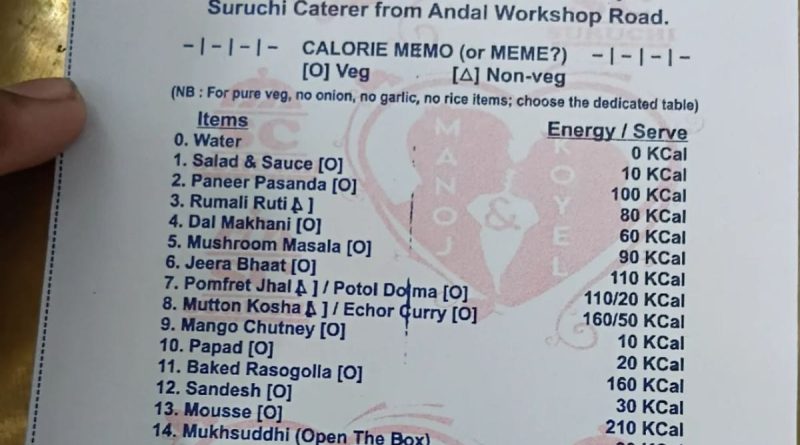Made By A Developer: Internet Reacts To Calorie-Listed Food Menu In Indian Wedding
The Unconventional Wedding Menu: A Caloric Insight into Indian Celebrations
Indian weddings are renowned for their grandeur and richness, creating a mesmerizing blend of vibrant decor, traditional rituals, and most importantly, a feast that tantalizes the taste buds. These celebrations are not just a union of two individuals but a cultural extravaganza, where foodies can indulge in a diverse culinary experience that reflects the essence of Indian cuisine.
A New Trend: Calorie-Conscious Catering
Recently, an Indian wedding took an unexpected approach to its dining experience by introducing a menu that included calorie counts for each dish. This unique concept allowed guests to be mindful of their dietary choices, transforming the traditional feast into a more health-conscious affair. The menu card, shared on Reddit, has sparked widespread interest and discussion.
The Menu with a Message
The menu card welcomed guests with a thoughtful message: “Welcome to Charity Hall for this celebration evening. Though we are here to celebrate Love and Togetherness, we are not on any 90-hour work agenda. So, please make yourselves comfortable and enjoy the dinner without wasting food, which is soon to be served on our behalf.” This heartfelt note was followed by a detailed list of dishes, each accompanied by its calorie content, encouraging guests to enjoy the meal mindfully.
A Closer Look at the Culinary Offerings
Starters and Main Courses
The carefully curated menu provided a mix of vegetarian and non-vegetarian delicacies. For example, the salad and sauce together were only 10 KCal, while richer dishes like Paneer Pasanda contained 100 KCal. A staple such as Rumali roti added 80 KCal, and dal makhani came in at 60 KCal. Mushroom masala offered 90 KCal, and jeera rice was 110 KCal. Non-vegetarian options like Pomfret jhal and mutton kosha were more calorie-dense, at 110 KCal and 160 KCal respectively. Vegetarian delights like potol dolma (stuffed gourd) and echor (jackfruit) curry were lighter, with 20 KCal and 50 KCal each.
Decadent Desserts
For dessert lovers, the menu offered a range of options with varying calorie counts. Mango chutney was the lightest at 10 KCal, while papad contained 20 KCal. Baked rasgullas were a richer option at 160 KCal, and sandesh was a modest 30 KCal. Mousse topped the dessert chart with a decadent 210 KCal.
Encouraging Balance and Movement
The menu concluded with a playful reminder: “You might be thinking we are calorie-conscious. No way! But it’s not good to hold all the carbs. So, let’s hit the dance floor and burn some calories!" This light-hearted message encouraged guests to balance their indulgence with some physical activity, embracing the festive spirit with dance and merriment.
Reactions from the Online Community
The unconventional menu garnered a flurry of reactions online. One user humorously noted, “Gym goers ka dream menu in shaadi (wedding).” Another appreciated the initiative, stating that it “will help people understand the consequences of their food habits.” Some commenters speculated about the menu’s origins, with one remarking, “Menu made by a developer.” Others questioned the calorie total, suggesting it was closer to 1600 KCal rather than 1200 KCal. Meanwhile, the menu made a few foodies nostalgic for traditional Bengali weddings.
Conclusion: A New Perspective on Tradition
This innovative approach to wedding catering illustrates a growing awareness and sensitivity towards health and wellness, even in the context of traditional celebrations. While some may see it as a modern twist, others might view it as a thoughtful effort to promote healthier choices without compromising on cultural richness. What are your thoughts on this unique culinary experience?

